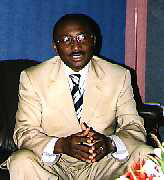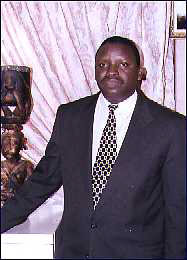 FREE MARKET FREE MARKET
 THE CHANGE TO A FREE MARKET ECONOMY THE CHANGE TO A FREE MARKET ECONOMY
The passage from communism to capitalism has not been easy. Supported by the Bretton Woods institutions (IMF , World Bank ) and by donor countries a structural program (PREF) was set up in order to help the economy grow.
During the dictatorial regime inefficient state monopolies controlled every aspect of the economy. These companies, instead of being productive, lived from state subventions, eating up large chunks of the State budget. Under the structural program public enterprises were either sold or liquidated. From a total of 378 public companies, only 10 remain fully in control of the state. However the State still owns shares in key businesses.
Sweeping reforms were introduced following the agreements signed with the IMF. Changes in monetary and banking policies were introduced including the devaluation of the currency, the introduction of a new national currency - the Guinean franc - liberalization of money exchange, and the restructuring of the banking system. All state banks were closed, being replaced by 6 private banks. Trade was liberalized. A new investment code was issued and price controls were eliminated. Since civil service was overcrowded - hundreds of ghost workers were included in the payrolls -, civil servants have been reduced 42% since 1986 passing from 90,300 to 52,000 presently. This has allowed a better service and a reduction in budgetary expenses.
 THE ROLE OF INTERNATIONAL FINANCIAL INSTITUTIONS THE ROLE OF INTERNATIONAL FINANCIAL INSTITUTIONS

The Bretton Woods institutions have played an important role in the development of Guinea. The recovery of the economy was probably the major challenge faced by the new government. Urged by the country’s many creditors, a Program of Economic and Financial Reform (PREF) was set up. The successful achievement of the goals earned Guinea a partial rescheduling of its debt in 1986 and IMF funding in 1987.
But the government has been constantly under pressure by International donors because of its excessive public expenditure and small state revenues. Guinea failed to obtain new financial help after 1987 from the IMF due to these factors and poor economic performance. The Guinean government doubled its efforts and from 1991 to 1996 the IMF and donor community provided new debt support.
|
The February 1996 armed coup was a blow to Guinea’s credibility before international financial institutions. In july 1996, Mr. Sidya Touré was appointed prime minister and he promptly set an austerity program designed to tame public expenditure and increase state revenues. This reassured international donors who granted new economic support and debt relief.
Guinea is today under its second year of IMF’s Enhanced Structural Adjustment Facility (ESAF) aiming to insure a coherent management of macroeconomics. In June 1998 the consultative group met in Paris granting Guinea a US$2 billion loan for the 1998-2000 period.
 A PRIME MINISTER WITH A VISION A PRIME MINISTER WITH A VISION
The prime minister, Mr. Touré ‚ an elegant middle-aged man educated abroad, did not come from the ranks of the ruling party, the PUP (Parti de l’Unité et du Progrès). This fact set him at odds with other members of the government. Determined to stay, he set himself to work establishing clear macroeconomic objectives to bring about the necessary reforms and regain trust from the donor community. In turn his negotiation power and excellent relations with international organizations have proven essential to attract foreign help and investment.

 THE LOWEST INFLATION RATE OF WESTERN AFRICA THE LOWEST INFLATION RATE OF WESTERN AFRICA
These efforts have helped to reduce the budget deficit of the GDP in less than 2 years. Since 1993 Guinea has been able to maintain a low inflation index obtaining the lowest consumer price index of Western Africa: 1.9% in December 1997. The rate expected in 1998 is 4%, due mainly to the economy’s growth and the need for cash. These remarkable figures have been achieved with the help of the Ministry of Finance and the Central Bank of Guinea .
The well-being of the population has also been a priority for Mr. Touré‚ especially in Conakry, the capital city, home of 1.1 million inhabitants. There he took to clean up the city and provide it with electricity. Streets are indeed much cleaner today than in the recent past, and electrical coverage has passed from 36% in 1996 to 100% in 1998. |

